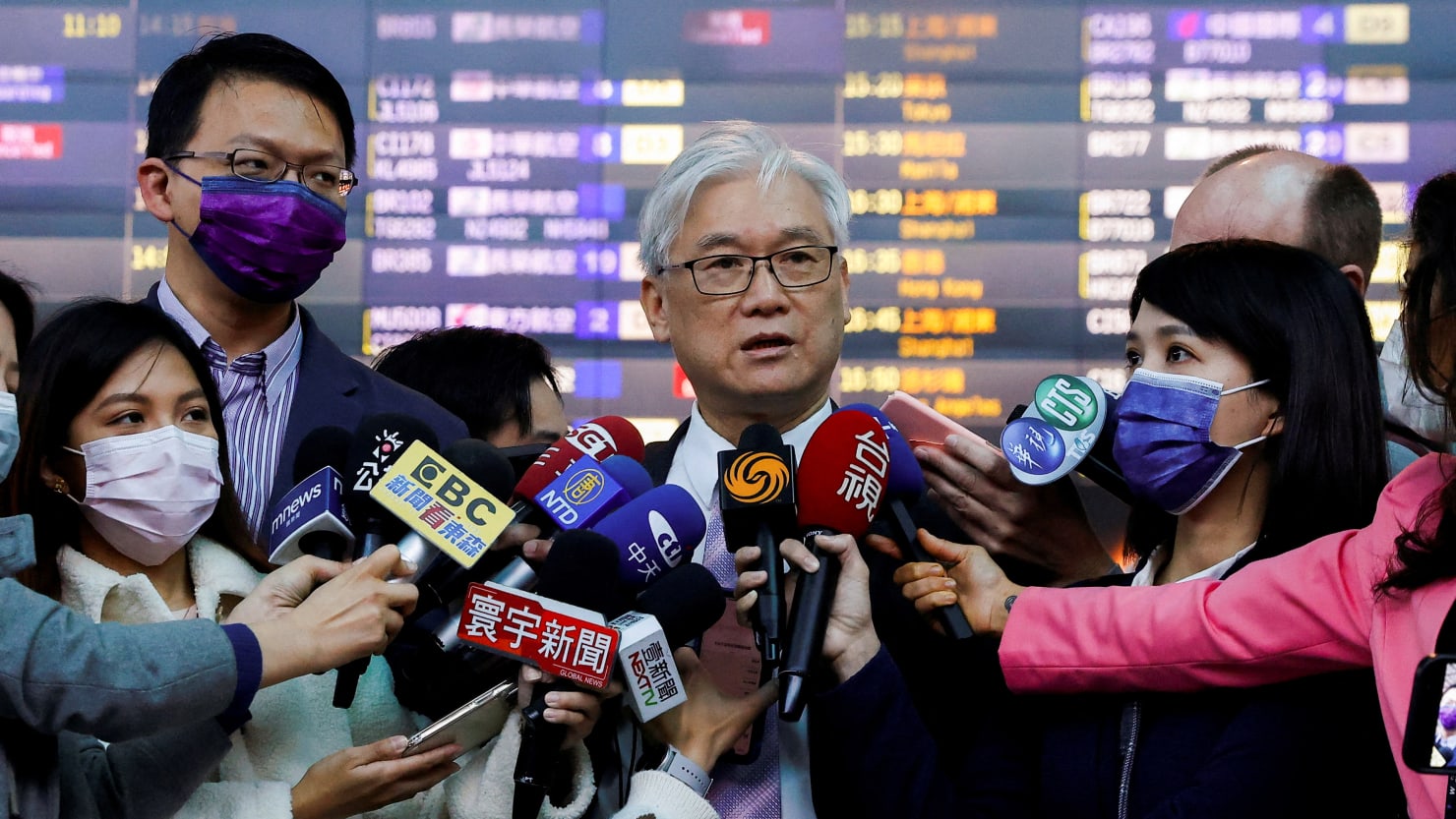Andrew Hsia, the Opposition Kuomintang (KMT) Vice Chairman from Taiwan, just wrapped up a controversial visit to China that has raised alarm bells within Taiwan’s ruling party about loyalties as tensions mount over China’s potential plots to invade Taiwan.
Chinese officials took advantage of the meetings to pressure Hsia to take a stand for the “One China” policy from the 1992 consensus, which acknowledges the existence of one sovereign Chinese state—a stance that fundamentally differs from the current approach of the ruling party, the Democratic Progressive Party (DPP).
Although Hsia was warned against sending the wrong message about Taiwan’s independence, Hsia met with a slew of top Chinese government officials, from Wang Huning, a member of the Politburo Standing Committee of the Chinese Communist Party (CCP), to Song Tao, the head of Beijing’s Taiwan Affairs Office. He also met with Yin Li, the CCP secretary of Beijing, according to CNA.
In at least one meeting, Song informed Hsia that China wants to build trust with the KMT based on a common understanding “of upholding the 1992 Consensus [the ‘One China’ policy] and opposing Taiwan independence,” according to Xinhua.
According to Xinhua, Hsia suggested that, based on the understanding of opposing Taiwan’s independence, Song’s party and the KMT could work together.
The interaction has kicked off a firestorm in Taiwan among those concerned that the KMT is willing to lean into the viewpoint that Taiwan should bend to China’s will, just as western officials warn that China could be gearing up for war.
The dicey trip coincides with public warning from the CIA Director in the United States that China is likely preparing to be able to invade Taiwan by 2027. U.S. officials have been warning this month that China is growing more aggressive and has been increasing its coercive operations in the Indo-Pacific region as well.
Internal divides
Upon his return in recent days to Taiwan, Hsia has been met with protests, with demonstrators yelling “shame on Hsia for selling out Taiwan to China,” according to Taipei Times.
“China is the only country that has vowed to invade and annex Taiwan, yet KMT officials betray Taiwan by agreeing to engage with China under its ‘one country, two systems’ plan and the ‘one China principle,’” Taiwan Statebuilding Party Chairman Wang Hsing-huan said.
The ruling party, the DPP, hit back, too, warning KMT that trips should be more “prudent” especially given rising cross-strait tensions.
“In response to KMT’s decision to send its delegation to China, we will have to remind that under the context of PRC’s continuous harassment of and coercion against Taiwan, as well as the current international situation, dialogues across the Strait should be more prudent to avoid sending wrong messages to the PRC and the international community,” DPP Chairperson Lai Ching-te warned in a statement.
The DPP said it “had regrets” that Hsia did not emphasize that the Taiwanese people will safeguard Taiwan’s sovereignty on the trip.
Other Taiwanese officials urged Hsia to avoid “rushing to demonstrate loyalty to China” at a time of high tensions.
“Chinese political warfare and influence operations… are going full bore.”
“We call on the Beijing authorities to respect the realities of cross-strait relations, abandon… coercive thinking… and improve the behavior of authoritarian expansion. Handle cross-strait relations responsibly,” the Mainland Affairs Council said, according to Liberty Times.
KMT and the ruling party in Taiwan have differed on perspectives about the One China principle for some time. In previous years, KMT has recognized the 1992 principle.
The entire affair might be about KMT trying to jockey for a leading position ahead of the 2024 presidential elections, said Derek Grossman, a former daily intelligence briefer to the director of the Defense Intelligence Agency and to the assistant secretary of defense for Asian and Pacific Security Affairs.
This is likely “KMT positioning itself as the party among the two—KMT and DPP—that is the more responsible actor in Taiwanese politics, that if elected to the presidency in 2024, the KMT… will try to reach some sort of accommodation with China in order to prevent the situation from spiraling out of control,” Grossman, now a senior defense analyst at the RAND, told The Daily Beast.
But “the optics certainly aren’t good,” Grossman said.
Given KMT’s previous stance on the 1992 consensus, Chinese officials are likely taking advantage of Hsia’s visit to curry favor in Taiwan, said Grant Newsham, a former diplomat and retired U.S. Marine Colonel who has studied Taiwan’s defenses.
“The Chinese Communists are of course capitalizing on Hsia’s visit,” with a likely eye towards influencing the upcoming elections, said Newsham.
If a more China-friendly party like the KMT were to win in 2024, China could consider itself to be one step closer to achieving its aims in Taiwan, Newsham warned. It could be “a step toward eventual victory, from the Chinese perspective,” he said. “Chinese political warfare and influence operations… are going full bore.”
But the timing of this particular trip has sparked alarm in Taiwan’s ruling party.
The visit comes at a tense time for Taiwan’s government after a year filled with Chinese aggression towards Taiwan; Chinese warplane incursions into Taiwan’s air defense identification zone doubled last year, according to the AFP. And just months ago, China began conducting protest military drills in the wake of then-House Speaker Nancy Pelosi’s visit to Taiwan.
Hsia’s contentious trip also comes as western leaders are working to address mounting questions about Beijing’s aerial surveillance program, ever since a Chinese spy balloon floated over the United States and the U.S. military shot it down earlier this month.
The flurry of activity has raised global concerns about China’s sweeping surveillance operations, which affect 40 countries around the world, according to U.S. officials.
Taiwan has itself has seen “dozens” of spy balloons near or over Taiwan in recent years in what some say is likely part of Beijing’s efforts to help inform radar and missile systems while it contemplates invasion plots.
Taiwan confirmed to The Daily Beast it will respond to spy balloons when national security or the safety of citizens are under threat, a spokesperson for the Taipei Economic and Cultural Representative Office (TECRO) told The Daily Beast.
“Taiwan’s approach to dealing with spy balloons is similar to that of the United States. Taiwan will respond to spy balloons when our national security or the welfare of our citizens are threatened,” the spokesperson told The Daily Beast.
The spokesperson did not elaborate on what comprises the policy on shooting down balloons or objects.






